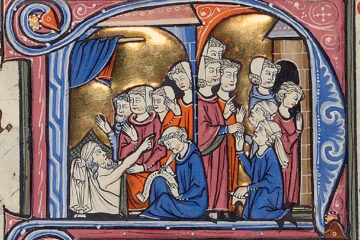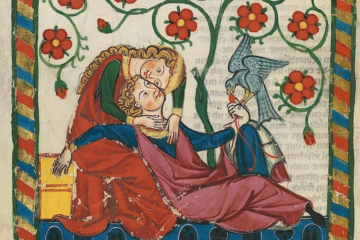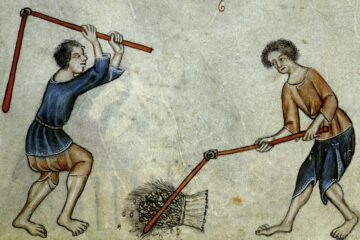Today, it is easy to forget the horrors of the year 1168 of our Lord, since they happened so long ago. However, the wounds are still fresh within the City itself. Rosewood, the former Imperial Capital, and Spiritual Successor to Rome and Constantinople was sacked for the first time in her history. It is said that the City developed from a small fortified settlement used by the Romans in the Gallic Wars during the times of Caesar. From then it remained small until the turn of the VII century when it was officially founded by the Franks. It then played a pivotal role during the wars of Charlemagne’s successors and the centuries after. When the Sirius Empire formed, Rosewood was chosen as its Capital, and since then has enjoyed a period of constant and exponential growth. Legends told of the glory of Rosewood. How if the City were to fall, the Empire would as well. How no mortal army could breach her walls. All those were proven false when the German army arrived in 1167 and set up a year-long siege around Rosewood.
As we understand it, Rosewood had a single wall of defense around it at the time, built long ago, but reinforced in the 11th century by Mayor Robbert I Fisher. Later generations of Mayors refused to construct a second wall around the evergrowing slums around Rosewood. With its rapid growth, soon there was no land left remaining within the walls. Therefore, newcomers made their homes and shops outside the walls, entirely undefended. Crime flourished within the area, and the same culture persists to this day.
By 1150, the slums had around 20.000 people living in them. 20.000 without any defense should a large army arrive at Rosewood’s gates. Even though the inner City could hold a lot of people, they would have no place to sleep should a siege reach Rosewood and prolong itself until the winter. One of the major granaries was outside the walls, undefended. These small mistakes, crucial details that went overlooked during the planning of the City is what led to its downfall.
“April 1167,
Preserved notes from Father Isaac of Rosewood dated 1168, found in the Rosewood Infirmary after the sacking
As we trust in you o Father, o Lord, I pray You will guide us once more through these troubles. The villainous German army has come some weeks ago and has cut off our City from the rest of the World. We, the men of France, do not fear them. We trust in Your mercy and justice. Rosewood has yet to fall to an invader. I beseech you, heavenly Father, bring forth a great winter and drive the Germans back to their Empire. On my knees I beg, let not this year be the year Rosewood falls.”
“June 1167,
You are kind to us, Father God. The Germans’ resolve wavers with each sunset. Every morning we taunt them with bread from the City walls. In their spiteful state, they resort to burning our homes outside the walls. Just yesterday I saw my home burst into flames. I built it with my own two hands, and the Germans reduced it to nothing. Barbarians! Bastards! All of them.”
“September 1167,
No more homes remain outside the walls. The air is thick with soot and ash, as the scorched ground weeps for its Emperor to rescue her. At night, the vast farmland surrounding Rosewood is set aflame. The embers and sparks dance late into the night while the soldiers tell me stories from the campaign into Lorraine. 1130 seems like a century ago. I tell them not to worry. I know Your will shall prevail. I see the trees turn orange at the coming of autumn. Soon winter shall come and the Germans will be driven out of our lands by the harsh French snows. In Your glory I trust, it is Your grace I seek. Amen.”
“November 1167,
Praise the Lord. Hallelujah! Amen! The first snow has come early. The trees are yet to balden during the autumn, yet you have sent your kind gift to us. The first snow has fallen. The little ones play and throw balls of snow at each other. We sing songs in Your name and we recite the stories of yore. At night I stay up late and watch the Germans. They sing songs in our tune, yet the words differ, save for the Latin ones. It is a shame this war happened. We may be of different breeds, but good Christians shouldn’t kill each other. However, there shall be no killing this year, as winter has come early. Within the month, the Germans will pack up and move out.”
“January 1168,
God. I am not writing this, but my son, John. I am too ill, but I must write down the thoughts which plague my mind. During the last days of the last year, I came down with consumption. My chest burns and I feel the Devil push against my every breath. I need only utter Your name and he flees. Such is the power of Christ. Still, I am left here to wonder why You’ve not dispersed the German forces. I hear their engines and how they chip away at our wall each day and night. Have you truly abandoned us, Lord? Have we committed some great sin or was Rosewood not the impregnable city of destiny like everyone always claimed it to be? Either way, I feel myself soon to join You. May the people of Rosewood know peace after I have left for oblivion. May Your light guide them. Amen.”
Father Isaac’s optimism painted a picture of what many within the city thought would happen. The Germans would come, then the winter would come, then the Germans would leave. It was like a handful of times prior. This time, however, God had other plans. Under Kaiser Wilhelm II, the German army was able to brave through the relatively weak winter, which despite that ended up claiming a good number of citizens within the city walls. It is said that the German trebuchets were able to breach the City walls on the 15th of August 1168.
As far as we know today, the fighting continued throughout the day. Emperor Charles “the Bold” gave his “Good men of France” speech and led a desperate defense before he was killed. What followed was three days of looting. So much was destroyed in the end and around 50.000 lives were lost. A near unrecoverable loss. If it hadn’t been for King Philip “the Just”, Rosewood would have become a ghost town and Alparis would be the capital today. To end off, we have the most reliable written account of the scenes directly before and after the Fall of Rosewood:
“Years have gone by and only now has the time come to share what I have seen. Do not take the time in between today and the 15th as an argument against the validity of what I saw. Trust me when I say this. No man could forget the horrors of the fall of Rosewood.
Written by Samuel Foster by request of the University, dated 1176, written in Kington.
I have lived in the city since I was born there in 1130. Being born at such a time, I was only two years old when the war broke out and I was 38 summers old when the walls fell. What cruel fate to have children born in war! I have known more of war than of peacetime. Peace was a tale my father used to tell me before I went to bed. We’d huddle around our fire during those long winter nights and he’d tell me stories of Kings and Emperors and the wild happenings in Rosewood that took place so long ago. But despite those hardships, there was little war. He told me had never before seen something like this. It was as though God sent his wrathful armies to wage war against us. To show us our erroneous ways. I don’t know what we were supposed to learn from the past fifty years of fighting. Perhaps that war is bad? I’ve little faith left and little mind to think about it. I only know that no one should have seen times as dreadful as those of the war.
I managed to find my way into the city before the siege began. I cried from joy thinking myself to be one of the lucky ones. I remember I still had friends on the outside. Friends I would see hanged outside while I stood atop the stone walls. Even then I felt relieved because I knew that safety lied on the inside. What a fool I was. We all were.
I don’t think the common folk ever got to see the Emperor as often and the nobility which followed him around like sad dogs. I remember Emperor Charles. His face was the face of a true Emperor. A strong beard, a gaze which could be thrown miles in distance and a voice which boomed and shook any man to his core. We were all happy because we knew the Emperor wouldn’t be here if he knew there was danger. We thought we had enough food to last years. We thought the winter would drive the Germans away. We thought the walls couldn’t be breached. We thought so many things, but we never thought about the challenges our Lord sends us. In our vanity, we had strayed too far from Him.
Even before the walls fell, there was horror in Rosewood. The winter wasn’t harsh enough to drive out the Germans, but it was cold enough to kill so many of us. I was one of those who had no roof over their heads. I spent nights in the churches and at the homes of people I befriended. While sleeping in those crowded spaces I could see the life leaving some people. I knew they were close to the end because their fingers and toes and noses were black from frost. They wept incessantly and uttered only soft prayers. Their lips were too dry to part and their eyes were constantly heavy. I got to see one man reach out to the roof of the church we were staying at. In the middle of the night he was calling our Lord and he went limp with the most dreadful sigh I had ever heard in my life. I prayed for him and I hope he is with our Lord now.
The days were no less frightening. The streets were filled with frozen corpses. Men, women and children died of either hunger or frost. At one point I recall walking to where Headow Keep once stood. There I saw a frozen woman holding a young babe in her hands. I tried to wake her, but to no avail. The frost had taken her, but not her daughter. I took the babe and took her to the first watchman I saw. While walking I thought of the life she could have had had the war ended. Upon her sixth birthday she would get a red dress with roses embroidered on them. Her name would be Carolina and she would be one of the smart girls who went to Church and picked up Latin. Her spirit was warm, seeing as she survived an entire night in her frozen mother’s embrace. But in this world, her mother is alive and she taught Carolina how to cook and tend the fields, even how to sew. I’d like to think she would be a good wife, perhaps to even a son of mine. I had planned out this poor babe‘s life while walking a few feet away from the place I had left her mother. When I gave her to the watchman, she started crying. That snapped me from my daze and I realized his unkempt beard, his breath which smelled of spirit and rotten teeth. His dead eyes looked at the babe and then to me. He told me they had no milk to feed her. I begged for her to be returned to me, that I would find some way. Carolina had to learn Latin and how to cook and sew. But no. He snapped her neck. I dare not judge another, as I am not Christ. But if there is a place worse than Hell, his soul was sentenced to it the moment he stole so much life which wasn’t his. I fell to the ground in grief and held Carolina in my arms after he had discarded her. I held the smallest and most innocent corpse that man had ever seen. May you find peace in the afterlife, my sweet daughter. And may your parents be there to shield you from the wicked.
Despite all of the toil and the struggle, I climbed the walls in February, right after the snow had stopped. And I held my breath, for I was not met with the white fields of France, but with a black army, bent on killing more of my friends and more orphans. From that day until the 14th of August I went to church every day. I prayed so hard I couldn’t unclasp my hands, come the end. I prayed no child experience death or war. I prayed the Germans away. I prayed God take my soul and spare everyone else. In vain I did this, for the 15th came and so too did destiny.
I was in the crowd while Emperor Charles gave his speech. I remember how he envigorated the citizens and soldiers. I admit I was one of those caught up in his talk of glory and duty. I had never held a sword in my life before, but now I found myself with one and standing at the bridge. I soiled myself when they charged. That’s the thing they leave out in the stories and songs. Men piss themselves when they sense their death approaching. I did not die, but I was struck in the head with a club. When I came to, all I could hear was screaming and all I could see or feel was fire. I picked up a spear and ran as fast as my legs could carry me. Buildings were falling around me and I even saw part of the wall collapse. I looked up to see Fernyard aflame. This truly was the end of time. I came across a soldier forcing himself upon a woman. She called out to me and I saw no other option. I charged and thrust my spear through his back. I easily pierced his gambeson and lodged the weapon within his guts. God forgive me, but that was the first life I ever took. It was in order to save her. She told me her name, Ella. Without thinking, I grabbed her arm and led her to an abandoned building. We barricaded the door and covered the windows. With all the carnage going on outside, we found some peace within this broken-down home and decided to share our stories.
Ella was the daughter of a hunter in Rosewood. She watched her husband die in the breach and fled to their home where she found her father dead. Just like that, she was both widowed and orphaned by the war that had already taken so many lives.
Ella and I spent two days there and finally left after the looting stopped. It’s as if the screaming and the burning ceased overnight. She wrapped herself around my arm and we proceeded to walk out and witness what war truly looked like. Imagine wide streets filled with corpses that give off a repugnant smell. The stink of rotting flesh assaults your senses as your throat contracts from the ash around you. Men were scattered around the cityscape like grain. Some still held their weapons in hand. There was a corpse frozen in a pose, holding his bowels. I will never forget the wailing of orphaned children nor the cries of defiled women calling out for their brothers and fathers. My hands tried to cover Ella’s ears, but it was in vain. She wept, but so too did I. We witnessed the death of the Empire. The death of a wonderful city. I pray that one day it is restored to its former glory. I don’t actually pray that often anymore. I just wonder why God would allow something like this to happen.
After that Ella and I just stayed together and made a home and family in Kington. Destiny had brought us together, and if losing a war is what it took, then it was well worth it. I’ve taught my children to pray for all those who died in the fall of Rosewood. Every soldier and knight, but also every starving babe, every frozen mother and every scared boy. If God is good, nothing like that will ever happen again, for we have learned our lesson. Never claim a city is impenetrable, for God will throw an army at it.”


